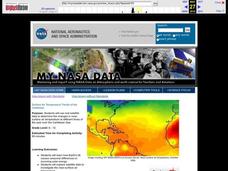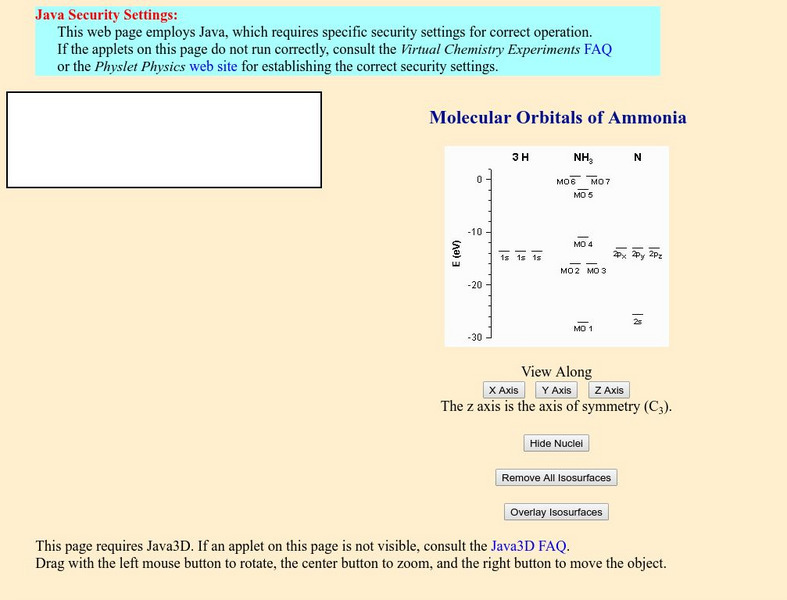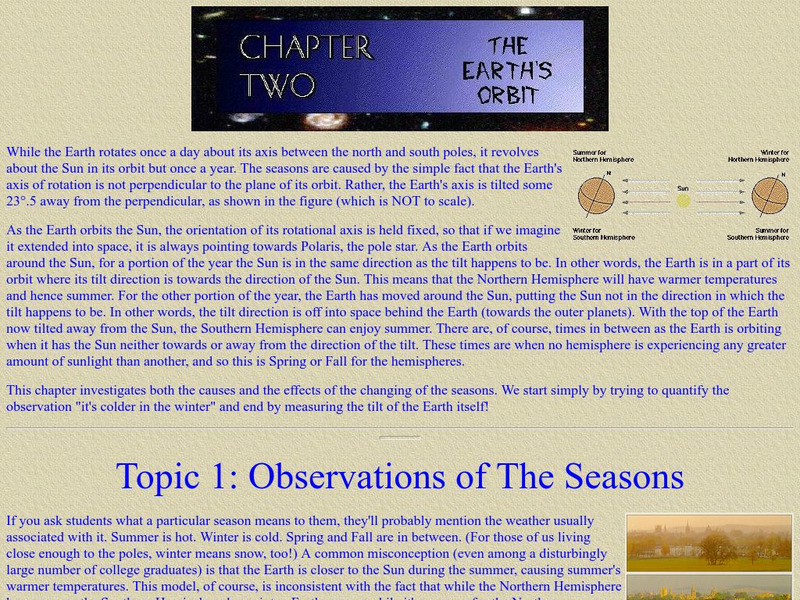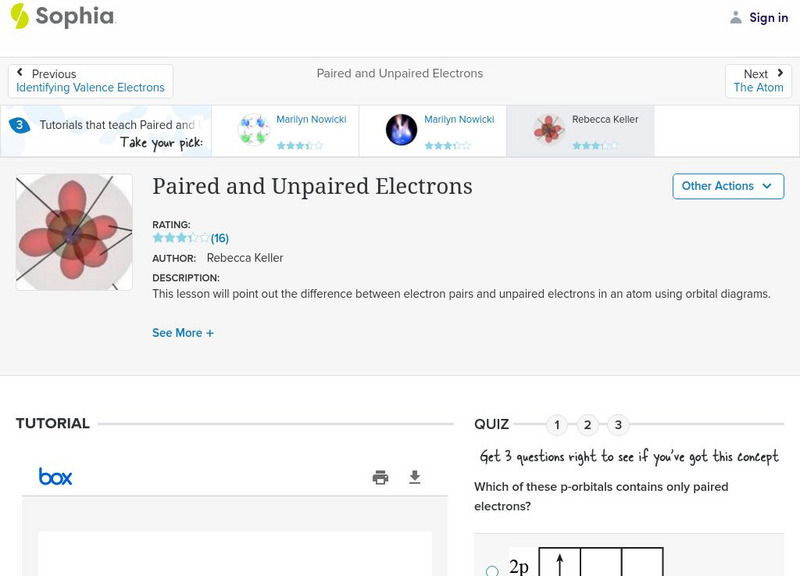Curated OER
Crystal Field Theory
In this crystal field theory worksheet, students practice using the theory to calculate high and low spin octahedral complexes. This worksheet has 10 problems to solve.
Curated OER
Scale Model of the Solar System
Pupils explore the size of the planets. In this science lesson plan, students create a scale model of the solar system. Pupils determine a scaling factor and calculate the size of their planets. Students create a scale drawing of the...
Curated OER
It's Just a Phase
Middle schoolers describe the phases of the moon and play a game with moon phase cards.
Curated OER
Surface Air Temperature Trends of the Caribbean
Students investigate the seasonal changes to sea surface and near-surface air temperatures near the equator. They use actual satellite data to track and graph the differences in air and sea temperatures during different seasons in the...
Curated OER
Atomic Theory
In this atomic theory worksheet, students use Planck's constant, Rydberg constant, and Avogadro's number to complete 20 multiple choice questions.
Curated OER
Tracking and Tracing Sunspots
Students examine sunspots. In this sunspot lesson, students use applets to investigate the movement of sunspots. Students research sunspots and evaluate the rotation of the sun. Lesson references outside resources not available in this...
Curated OER
Retrograde Motion of Mars
Middle schoolers investigate the motion of Mars. In this space science lesson, students use transparencies to trace the path of Mars through constellations. Middle schoolers discuss the characteristics of the planet.
Curated OER
Finding Jupiter's Moons
Students explore Jupiter's Moons. They calculate and predict the location of Jupiter's 4 large moons. In addition, they draw Jupiter with its moons correctly shown for the time of the observation.
Curated OER
Space: The Final Frontier
Sixth graders construct a graph to demonstration information that they've learned about the solary system. They also write or illustrate a sonar or lunar eclipse.
Curated OER
The Man Who Saw the Future: Arthur C. Clarke
Students are introduced to science fiction as an adjunct to learning about science. They tape into their creativity by combining science with aspects of the arts. They research real time data available on the Web about space, and Mars in...
Curated OER
History of Astronomy
Students participate in assessments regarding the history of astronomy. They listen and take notes, draw a time line, draw a solar sytem designed by Ptolemy and create flashcards. They write an essay on Galileo, watch a video, take a...
Crescent Public Schools
The Internet Science Room: Electron Configuration and Orbital Diagrams
Students use this chemistry tutorial to guide their understand of electron configuration and orbital diagrams.
Simon Fraser University
Chem1 Virtual Textbook: Molecular Orbitals
Acting as an overview from the General Chemistry Virtual Textbook, this site explores the topics related to molecular orbitals including bonding and antibonding MOs, molecular orbital diagrams, sigma and pi orbitals, and more.
Davidson College
Davidson College: Visualization of Atomic Orbitals: Hybrid Orbitals
Explains the creation of hybrid orbitals and presents their electron density plots and energy diagrams. Requires Java.
Davidson College
Davidson College: Molecular Orbitals of Tetraamminecopper(ii)
A Java applet displays the Ligand Field Theory energy diagram for the Tetraamminecopper(II) ion. When an orbital in the diagram is clicked on, the isosurface is shown.
Davidson College
Davidson College: Molecular Orbitals of Diamminesilver(i)
A Java applet displays the Ligand Field Theory energy diagram for the Diamminesilver(I) ion. When an orbital in the diagram is clicked on, the isosurface is shown.
Davidson College
Davidson College: Molecular Orbitals of Ammonia
A Java applet shows a molecular orbital representation of ammonia. When an orbital in the diagram is clicked on, the isosurface is shown. The orbitals for other molecules can be accessed through links at the bottom of the page.
Chiral Publishing
Chiral Publishing: An Introduction to Chemistry: Multi Electron Atoms: Audio Book
This audio book, narrated by author Mark Bishop, describes how to write regular and abbreviated electron configurations, and how to draw orbital diagrams. Also find links to animations, tutorials, power points, and chapter maps about...
Harvard University
Eyes on the Sky, Feet on the Ground: The Earth's Orbit
Students perform many inquiry activities related to Earth's orbit. Included are recording daily temperatures, observing the sun's path over several weeks, tracking sunrise and sunset times, and angle of sunlight. Diagrams make lessons...
Sophia Learning
Sophia: Paired and Unpaired Electrons: Lesson 2
This lesson will point out the difference between electron pairs and unpaired electrons in an atom using orbital diagrams. It is 2 of 3 in the series titled "Paired and Unpaired Electrons."
Michael Blaber, PhD
Fsu: Basic Concepts of Chemical Bonding: Exceptions to the Octet Rule
Lists the exceptions to the octet rule and provides a discussion and diagrams explaining each one. Includes clear diagrams illustrating this concept.
Physics Classroom
The Physics Classroom: Circular Motion Principles for Satellites
From The Physics Classroom. Uses easy- to-understand language to discuss how circular motion principles apply to the motion of satellites. Describes the tangential velocity and centripetal acceleration of a satellite. Includes many...
Chiral Publishing
Chiral Publishing: An Introduction to Chemistry: Modern Atomic Theory [Pdf]
The modern atomic theory chapter from "An Introduction to Chemistry", describes electrons, electron orbitals, and how to draw orbital diagrams. Many pictures and examples help to explain the information. Also find a detailed chapter...
NASA
Nasa Star Child: The Space Shuttle (Level 1)
This site provides a short description of the space shuttle and what it is used for, with diagrams and one quiz question.

















